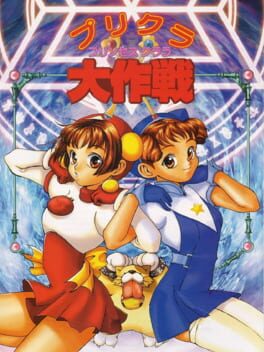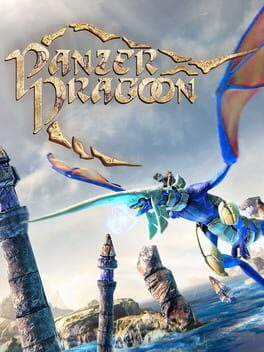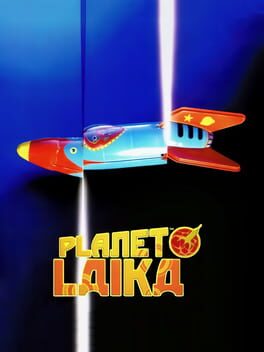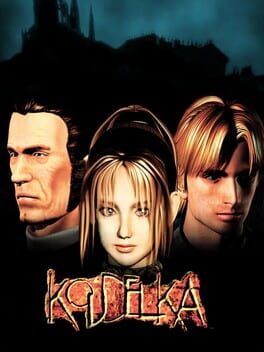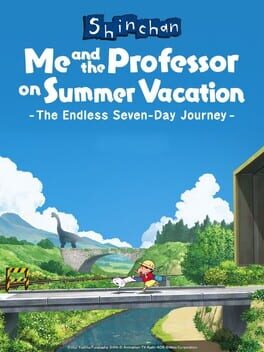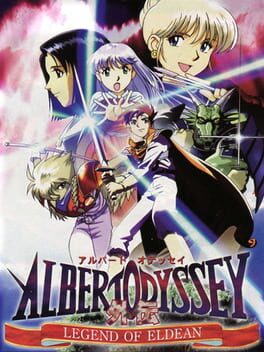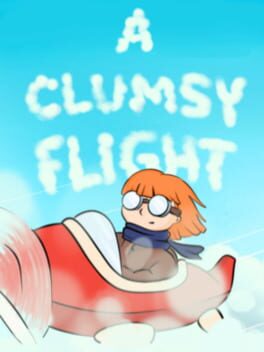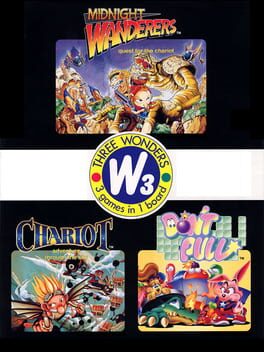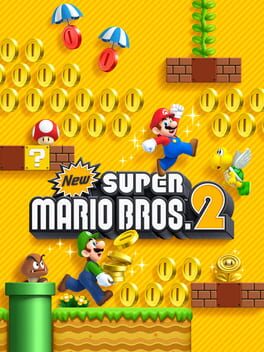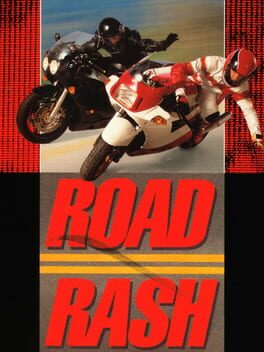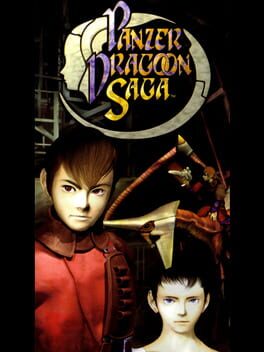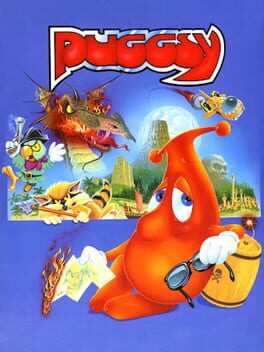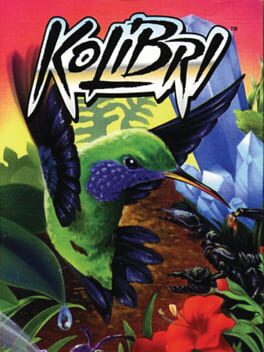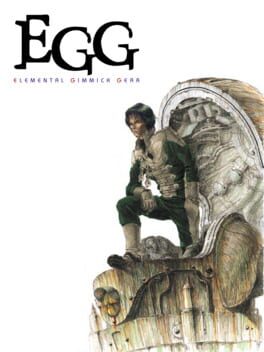Funbil
1996
It’s finally happened… For so long I’ve been trying to find overhead shooters that I'd like as much as Pocky & Rocky. All this time I’ve been trying games that broadly fit my criteria for this, but only today did I finally find the game that fulfills that role about as perfectly as I could ask for, as well as providing a uniquely refreshing take on the formula. Obviously, that game is Purikura Daisakusen. Not only does it fit the surprisingly endangered category of “an overhead shooter without guns,” but it also takes that non-violence a step beyond by not exactly killing the enemies, but magically transforming them into animals Sonic-style, and collecting those animals is what raises the score. It turns into a pretty neat juggling act where destroying the enemies is mostly an act of self-preservation, and then rushing to catch all the scampering animals before they fall off the stage is what actually counts towards the score. It’s an incredibly dynamic system that made me play this kind of game in a way I never really have before! Not to mention that the bosses in this game so loudly and hilariously juxtapose the Pretty Cure/Cardcaptor Sakura magical girl fantastical charm by being these huge, heavy, bulking militarized mechanical weapons which creates this tug-of-war in the game’s tone that I found incredibly endearing. And as far as the idea of a Pocky & Rocky-like goes, it even has a secondary melee attack (which feels great to use) and a dodge roll; Pocky & Rocky's dive, I’ve found, is one of the reasons I feel its gameplay is so much more engaging than other overhead shooters, as it provides a constant question of risk/reward considering how any particular enemy pattern should be handled. I’ve proudly declared Pocky & Rocky Reshrined as my game of the year, but it turns out I didn’t need to wait nearly so long to find my fix of the gorgeously presented, hectically balanced, tonally resonant overhead shooter as I thought I did. Purikura Daisakusen has been sitting here waiting for me the whole time.
The world has developed in such a way where I'm allowed to play Panzer Dragoon running 60 frames per second at 2560x1440 resolution with brilliantly redone models and textures and I couldn't ask for anything more. Well, besides being able to play the other Panzer Dragoon games like this too, of course. If you're not chill with this you're not chill with me and it really is just that simple
1999
1999
This was an incredibly hard game for me to put down!! Looking around the internet it seems like people think the RPG gameplay weighed it down compared to more typical horror games, but I thought the battles were impressively well-balanced (I never died once, but most boss battles did have me close to the wire so every victory felt satisfactorily earned) and allocating characters’ stats proved to be meaningful and engaging, something which other games can flounder with. And for someone like me, who doesn’t do especially well with scary stuff (I usually get my friends to play scary games so I can watch…), Koudelka wound up being pretty perfectly tuned to my exact sensibilities of wanting that creeping, dreadful, oppressive atmosphere with some abstractly-gruesome imagery, while never being anything that discouraged me from playing by being “too much” (a balance I’ve only ever really found in Silent Hill games). What an incredible little thing!! A horror RPG that even wimps like me can have a wonderful time with - and doesn’t waste that time either, clocking in at only 13 hours in my sometimes meandering playthrough. Not even to mention some of the absolute best voice acting and choreography I’ve seen in any game, let alone one on the original Playstation. What a refreshing gem to have stumbled into by accident. Going in I knew nothing, but coming out I’m leaving with a new favorite.
Boku no Natsuyasumi is a summer vacation; Shin-chan is a video game that is set during a summer vacation.
The gentle, understated daily morning exercises of Bokunatsu are pantomimed in Shin-chan with throaty yells and militaristic marching music. Nobody dares to speak a single authentic word with each other lest it gets in the way of whatever tired, juvenile joke Shin-chan is about to sucker them into. The player is constantly corralled down a main path so the game can continue expositing this narrative about a mad scientist and his dinosaurs, which regularly (and fatally) pierces through whatever atmosphere the game may have had with their garish clown music and exaggerated bombast.
Experiences are objectified as Things to Collect so that they may be included in the local newspaper and gain subscriptions. The wildlife is objectified as Things to Collect so that they may be traded in for money with the local shop owners. The money must be collected so food can be bought to satiate Shin-chan’s stamina meter; if it empties, Shin-chan faints due to hunger and is sent back to the house his family is staying at. This stamina meter turns even something as fundamental as walking into a number to manage. Everything is a datapoint. This is not a vacation. This is taking the beauty and joy and the little quirks of living and twisting it into a loveless economy.
Sometimes, in the quiet gasps for air between micromanaging a preschooler’s summer vacation and the squealing displays of Saturday-morning-cartoon-ish storytelling, whispers of Millennium Kitchen’s legacy can be felt in the breeze. Sometimes walking lazily through beautifully rendered backgrounds with considerately composed perspectives feels just as comfortable and familiar as it’s supposed to. This lasts until the mistake is made of interacting with the game at all by catching a bug or a fish or picking up an item, to which Shin-chan will once again holler out his raucous yawps, and being shown the name of that collectible inevitably calls to mind: “The girl who runs the grocery store will pay me 100 yen for six of these.”
Maybe someday Millennium Kitchen will have the opportunity to localize one of their games that doesn’t feel the need to obsessively gamify itself or “subvert” whatever honest sentiments they’ve drawn upon for the mainline Boku no Natsuyasumi titles. I also wonder how much of this obnoxiousness comes from the fact that they’re working with the Shin-chan intellectual property in particular. Attack of the Friday Monsters, their previous game, had similar problems in tone but at least wasn’t nearly so vapid. Maybe this is what they think Western audiences want. Looking at current review scores around the internet, maybe they’re right. Personally, I’d prefer a summer vacation over a video game set during one.
The gentle, understated daily morning exercises of Bokunatsu are pantomimed in Shin-chan with throaty yells and militaristic marching music. Nobody dares to speak a single authentic word with each other lest it gets in the way of whatever tired, juvenile joke Shin-chan is about to sucker them into. The player is constantly corralled down a main path so the game can continue expositing this narrative about a mad scientist and his dinosaurs, which regularly (and fatally) pierces through whatever atmosphere the game may have had with their garish clown music and exaggerated bombast.
Experiences are objectified as Things to Collect so that they may be included in the local newspaper and gain subscriptions. The wildlife is objectified as Things to Collect so that they may be traded in for money with the local shop owners. The money must be collected so food can be bought to satiate Shin-chan’s stamina meter; if it empties, Shin-chan faints due to hunger and is sent back to the house his family is staying at. This stamina meter turns even something as fundamental as walking into a number to manage. Everything is a datapoint. This is not a vacation. This is taking the beauty and joy and the little quirks of living and twisting it into a loveless economy.
Sometimes, in the quiet gasps for air between micromanaging a preschooler’s summer vacation and the squealing displays of Saturday-morning-cartoon-ish storytelling, whispers of Millennium Kitchen’s legacy can be felt in the breeze. Sometimes walking lazily through beautifully rendered backgrounds with considerately composed perspectives feels just as comfortable and familiar as it’s supposed to. This lasts until the mistake is made of interacting with the game at all by catching a bug or a fish or picking up an item, to which Shin-chan will once again holler out his raucous yawps, and being shown the name of that collectible inevitably calls to mind: “The girl who runs the grocery store will pay me 100 yen for six of these.”
Maybe someday Millennium Kitchen will have the opportunity to localize one of their games that doesn’t feel the need to obsessively gamify itself or “subvert” whatever honest sentiments they’ve drawn upon for the mainline Boku no Natsuyasumi titles. I also wonder how much of this obnoxiousness comes from the fact that they’re working with the Shin-chan intellectual property in particular. Attack of the Friday Monsters, their previous game, had similar problems in tone but at least wasn’t nearly so vapid. Maybe this is what they think Western audiences want. Looking at current review scores around the internet, maybe they’re right. Personally, I’d prefer a summer vacation over a video game set during one.
One of the coolest games I've ever played with one of the coolest boss fights in an RPG with one of the best localizations I've ever seen with some of the best music in the genre BUT ALSO one of the worst-paced games I've ever played with the single worst boss fight in an RPG with one of the most annoying localizations I've ever seen. The only thing I'm not conflicted about is the quality of the music, this shit is otherworldly. Everything else is a constant pendulum swing to being incredible or insufferable. Awesome game! Awful game! I'm still not really sure how it exists!!
2022
1991
Incredible package of two awesome little games. They both wear their inspirations on their sleeves (I promise the design documents were two pages each; one with screenshots of Ghouls n Ghost and Gunstar Heroes, the other with Gradius and R-Type) but still manage to find its own voice with unique things to say. One might look at that list of inspirations and be put off; these are all games that pose pretty significant challenge, as well as being games that are bastardized constantly. A welcome surprise was to see that, despite these being arcade games and despite where its ideas all originated, the two games are pretty breezy! The versatile player control options and upgrades make the surreal romps through fantastical locations brisk and engaging, allowing nothing to get in the way of appreciating of just how delicately and considerately the levels were designed. And like I said, just because these games draw obvious inspirations does not mean they're retreads of tired ideas. Every moment of every level and every boss had me impressed and delighted at how fresh their ideas are and how acutely they're executed. These two games have more than earned a spot standing shoulder-to-shoulder with the giants they hearken back to.
Wonderful two games. Not sure why they called it Three Wonders, though. There's only two wonders. I did notice some, uh, weird thing in this game tacked on like gum stuck to the bottom of a shoe. Not really sure what it was. Certainly wasn't wonderful, I'll tell you that. Two Wonders.
Wonderful two games. Not sure why they called it Three Wonders, though. There's only two wonders. I did notice some, uh, weird thing in this game tacked on like gum stuck to the bottom of a shoe. Not really sure what it was. Certainly wasn't wonderful, I'll tell you that. Two Wonders.
There's some truly fascinating level design concepts here, but they never get a chance to reach their fullest potential because they're exclusively in service of a gameplay gimmick which I'm not enough of a kleptomaniac to find engaging. Every level feels stifled by its obsession to make everything about collecting coins.
1991
1998
World-renowned auteurs have spent their entire careers trying to re-capture even just a fraction of what it wields so confidently, finding a full foundation on which to build their own legacies from even just small pebbles chipped off of its memory.
There has never been anything else quite like it. There will never be anything else quite like it.
It is exactly what it wants to be. It is exactly what it needs to be.
It is a towering monument to both what humanity is and what humanity is capable of.
It is Panzer Dragoon Saga.
There has never been anything else quite like it. There will never be anything else quite like it.
It is exactly what it wants to be. It is exactly what it needs to be.
It is a towering monument to both what humanity is and what humanity is capable of.
It is Panzer Dragoon Saga.
1993
1995
Le vert colibri, le roi des collines,
Voyant la rosée et le soleil clair
Luire dans son nid tissé d'herbes fines,
Corme lm frais rayon s'échappe dans l'air.
II se hâte et vole aux sources voisines,
Ou les bambous font le bruit de la mer,
Ou I'aoka rouge aux odeurs divines
S'ouvre et porte au cœur un humide éclair.
Vers la fleur dorée il descend, se pose,
Et boit tant d'amour dans la coupe rose
Qu'il meurt, ne sachant s'il l'a pu tarir.
Sur ta lèvre pure, o ma bien-aimée,
Telle aussi mon âme eut voulu mourir,
Du premier baiser qui l'a parfumée.
Voyant la rosée et le soleil clair
Luire dans son nid tissé d'herbes fines,
Corme lm frais rayon s'échappe dans l'air.
II se hâte et vole aux sources voisines,
Ou les bambous font le bruit de la mer,
Ou I'aoka rouge aux odeurs divines
S'ouvre et porte au cœur un humide éclair.
Vers la fleur dorée il descend, se pose,
Et boit tant d'amour dans la coupe rose
Qu'il meurt, ne sachant s'il l'a pu tarir.
Sur ta lèvre pure, o ma bien-aimée,
Telle aussi mon âme eut voulu mourir,
Du premier baiser qui l'a parfumée.
At the yolk of this game are some neat ideas, but unfortunately it’s quite a tough egg to crack. Elemental Gimmick Gear puts all its eggs in the basket of tried and true Zelda-adjacent formulas but doesn’t seem to understand what makes those mechanics work; enemies do too much damage, the players’ attacks are too small and too slow, the dungeons have no sense of continuity and the bosses have way too much health. Along the way are capsules to help upgrade stats like attack and defense, as well as unique elemental attacks that feign the opportunity of evolving combat options, but they don’t do enough to soften the boil. This entire game requires too much walking on eggshells to prevent swift and unfair game overs.
Elemental Gimmick Gear does hatch a more narrative angle than Zelda games tend to push, which similarly has moments of inspiration that shine through the cracks, though by the end it’s got egg on its face trying to juggle too much worldbuilding lore and loose themes that haven’t got a proper place to roost. The more the narrative incubates, the more it spoils, and it ultimately is not worth the strenuous effort of playing the game to see through to the end.
This game’s just a few too many eggs short of a dozen.
Elemental Gimmick Gear does hatch a more narrative angle than Zelda games tend to push, which similarly has moments of inspiration that shine through the cracks, though by the end it’s got egg on its face trying to juggle too much worldbuilding lore and loose themes that haven’t got a proper place to roost. The more the narrative incubates, the more it spoils, and it ultimately is not worth the strenuous effort of playing the game to see through to the end.
This game’s just a few too many eggs short of a dozen.
